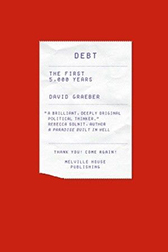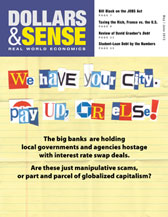
Pass the Salt!
Review of Debt: The First 5,000 Years, by David Graeber. Melville House, 2011.
This article is from Dollars & Sense: Real World Economics, available at http://www.dollarsandsense.org

This article is from the May/June 2012 issue of Dollars & Sense magazine.
Subscribe Now
at a 30% discount.
A reprise of Chris Nealon's May/June 2012 review of Debt: The First 5,000 Years, by David Graeber, who died on September 2, 2020.
The financial meltdown of 2008 unleashed a whole stream of books by professional economists that promised to explain what happened. From a wide variety of perspectives, Nobel laureates and former Federal officials weighed in on the problems with the American economy, or the global economy, or capitalism in general, and offered prescriptions for a “cure.” The prescriptions were not surprising: liberals favored more regulation of the financial sector, without asking why the financial sector should drive the economy. Conservatives—when they bothered to address the crash in analytic terms at all—insisted on the aberrant nature of the crisis, preferring to trust the financial sector to monitor itself in the future. With the exception of the Marxist geographer David Harvey, very few prominent observers in the English-speaking world took the occasion of the crisis to ask why we had committed to a capitalist economy in the first place.
Not even an indispensable figure like Harvey, though, raised the radical questions that anthropologist David Graeber does in his recent book Debt: The First 5,000 Years. From Graeber’s perspective we have a responsibility, not only to recognize that having a capitalist economy is not inevitable, but to understand the long history of how we came to talk about having an “economy” at all. I laughed when I first read the subtitle of the book—“The First 5,000 Years”?—but it’s no joke. Graeber is dead serious about reaching back into the distant past, if it will help us come to terms with our deepest beliefs about money, value, and human nature. Why, he asks, do so many societies share a belief that paying back a debt is a mark of virtue, but that lending money is tainted, even evil? Why is indebtedness both seen as necessary to keeping society in motion, but also criminalized and mercilessly punished? Why do we say “please” and “thank you” when we pass money over the counter at the coffee-shop or the grocery store? Why do we think interactions involving money place us in a sphere of life called “the economy” that’s separate from everything else we do?
Graeber’s Debt is a treasure-trove of historical insight into these questions. Across the course of the book’s twelve chapters, he offers well-grounded speculations on why the rise of the world’s great monotheistic religions coincided with the emergence of state-issued coinage; he asks why there have been far more rebellions, in recorded history, against debt poverty than against caste- or class-based systems of hierarchy; and he pursues the implications of the fact that the first recorded use of a word for “freedom” is in a Sumerian decree forgiving peasant debts. Perhaps most impressively, he uses his investigation into debt to re-interpret the histories of colonialism, patriarchy, anti-Semitism, and slavery. In Graeber’s view, these kinds of historical violence make more sense when seen as forms of cruelty that arise out of the desperate indebtedness of wealthy people to even wealthier ones.
All of these insights are the result of extensive research. Much of it is secondary: one of the amazing things about Debt is how coherent a picture it builds out of wildly diverse scholarship on African, Indian, Chinese, Latin American, North American, and European history, as well as the politics, religion, and philosophy of those regions. Because I am unlikely ever to read through the fascinating books in Debt’s bibliography, I am grateful for Graeber’s powers of synthesis.
But the aim of the book is not to dazzle us with its scholarship. Debt was written with two other goals in mind: first, to call into question the story about the rise of capitalism that we are told by professional economists; and second, to give us permission to believe ourselves capable of being something other than narrowly self-interested agents of a greedy “human nature.”
Right off the bat, Graeber deftly undoes the history of capitalism we’ve been told by economists. He is not alone in noticing that, from Adam Smith on, the ideal “economy” described by professional economists has been more fantasy than reality: is it all too hard to find an economy in the real world that’s populated by perfect little subjects of enlightened self-interest. Graeber goes further than this, though, and suggests that the official story of how we arrived at capitalism is also false. A key piece of capitalist myth-making is that in primitive societies, people bartered items for each other until the complexity of society demanded that a mediating third term was required for trade, and so money was born. Since money was an abstraction, the story goes, it makes perfect sense that credit— an even more abstract form of money—should gradually develop out of cash exchanges. According to this story, the complex forms of virtual money that drive finance—and that trigger financial crashes—are the natural outcome of simple systems becoming more complex. The story has the appeal of sounding natural, like a benign “evolution.” And the power of the story is that, since abstract finance is understood to be as natural as other evolutionary features, like large fore-brains, then no crash is severe enough to justify abandoning a finance-led economy: it would be like abandoning our higher brain function!
This story of virtual money as the evolutionary descendant of primitive barter, though, is demonstrably false, and it is one of the key achievements of Debt to alert us to this. Turning to the vast scholarship at his disposal, Graeber shows that, from the time of the earliest Mesopotamian records, the story of “the economy” is not one of primitive barter becoming modern finance. It is, rather, the story of economies built around mutual aid, and interpersonal trust, that are periodically forced to submit to the imposition of coin and paper money by financially-strapped kings and emperors—forced, in other words to become “economies” separate from the texture of daily life. Rather than “the fabled land of barter,” Graeber says, “virtual money came first”—in the form of tokens, of promises, of trust-driven agreements that didn’t involve cash. Indeed, as Graeber helps us see, historically we’ve used the phrase “cold, hard cash” not just to indicate that cash is real and trustworthy, but also the opposite—that it is cold and impersonal, best used with strangers, foreigners, people with whom one has no relation of trust.
That’s the historical part of Graeber’s argument. But it’s the way he pairs his historical scholarship with a moral angle that gives Debt its power. As Graeber puts it,
If we really want to understand the moral grounds of economic life, and by extension, human life, it seems to me that we must start ... with the very small things: the everyday details of social existence, the way we treat our friends, enemies, and children—often with gestures so tiny (passing the salt, bumming a cigarette) that we ordinarily never stop to think about them at all.
Rather than explaining these small gestures by way of the myth of enlightened self-interest, or by the mathematics of game theory, however, Graeber sees them as evidence of an age-old reserve of human creativity and casual solidarity that, by the end of the book, begins to seem like a powerful alternative to financial understandings of debt. On the last page of the book, in a conclusion I find quite moving, he writes,
What is a debt, anyway? A debt is just the perversion of a promise. If freedom (real freedom) is the ability to make friends, then it is also, necessarily, the ability to make real promises. What sorts of promises might genuinely free men and women make to each other?
In the 1990s, the anti-globalization movement reminded us that “another world is possible.” The power of Debt lies in how Graeber shows that, for a very long time, another world has actually been right here, all along. I have read few books in the last ten years as compelling as Debt. Along with Naomi Klein’s The Shock Doctrine, it forms a kind of new foundation for readable, critical economic history. So—pass the salt, bum a cigarette, and get yourself a copy.
Did you find this article useful? Please consider supporting our work by donating or subscribing.
